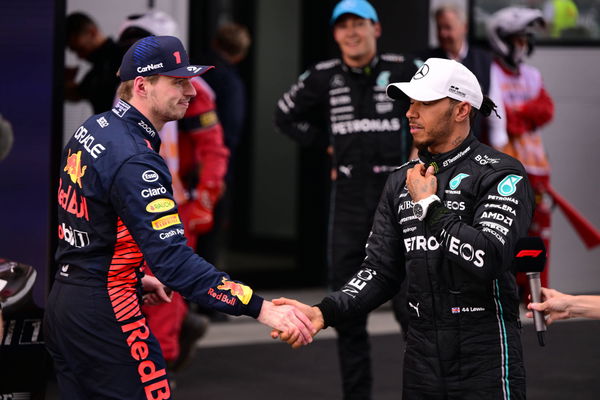
via Imago
F1 Grand Prix of Spain Max Verstappen of Red Bull Racing Honda and. Lewis Hamilton of Mercedes-AMG Petronas F1 Team celebrate on podium during race of. Spanish GP, 8th round of FIA Formula 1 World Championship, WM. Weltmeisterschaft in Circuit de Catalunya, Montmelo, Catalunya, Spain. 04/06/23 Montmelò Catalunya Spain. PUBLICATIONxNOTxINxFRA Copyright: xAndreaxDiodatox originalFilename:diodato-notitle230604_npiia.jpg

via Imago
F1 Grand Prix of Spain Max Verstappen of Red Bull Racing Honda and. Lewis Hamilton of Mercedes-AMG Petronas F1 Team celebrate on podium during race of. Spanish GP, 8th round of FIA Formula 1 World Championship, WM. Weltmeisterschaft in Circuit de Catalunya, Montmelo, Catalunya, Spain. 04/06/23 Montmelò Catalunya Spain. PUBLICATIONxNOTxINxFRA Copyright: xAndreaxDiodatox originalFilename:diodato-notitle230604_npiia.jpg
“Just please bring a V12 or a V10 back,” said Lewis Hamilton as Ross Brawn showcased what the newer generation of F1 cars might look like in 2020. For about a decade, F1 drivers have yearned for the naturally aspirated V8 or V10 to make a comeback in F1. And now, Lewis Hamilton and Max Verstappen’s vision has become a reality, with Stefano Domenicali teasing a massive change in engine regulations.
The V6 Turbo Hybrid was introduced at the start of the 2014 season to make the engines more efficient, use less fuel, and reduce the carbon footprint. However, it didn’t bode well with either the fans or the drivers, who didn’t like the sound that the smaller turbocharged engines made. Some even compared it to the sound of a vacuum cleaner. As for the drivers, they did not like the drivability of the boosted engines.
Formula 1 is considering different engine rules for 2030 to increase noise, with a move away from current hybrid systems being one of the options.
All the details here ⬇️https://t.co/AFJX7urmVa #F1
— Motorsport.com (@Motorsport) May 15, 2024
ADVERTISEMENT
Article continues below this ad
Max Verstappen advised on how he would “definitely get rid of the hybrid. I think all the time, when I jump back in a V8, I am always so surprised at how smooth the engine is.” Lewis Hamilton is also on the same page as Max Verstappen, he explained how it was the greatest sound of a racing car ever as Fernando Alonso took his championship-winning Renault with the V10 around the track. He added how he hates that F1 got rid of it.
And now Stefano Domenicali has come out with hopes of getting rid of the hybrid system from 2030 engine regulations. According to Motorsport, he said, “As soon as the 2026 regulations are defined, we will start to think about what the next steps will be, such as the 2030 engine. It is a personal consideration of mine, not yet shared with the teams, even if we have spoken about it with the FIA, that if sustainable fuels work, we will need to carefully evaluate whether to continue with hybrid (technology) or whether better solutions will be available.” Regardless, there are doubts over the new upcoming 2026 engine regulations, as explained by F1 Pundit Karun Chandhok.
ADVERTISEMENT
Article continues below this ad
F1 2026 engine regulations: The complexity of having half the power
The engine regulations for 2026 will be published officially on the 1st of June this year. However, teams have already conveyed the basics and the minor details will be made clear on June 1. The 2026 engines will have 50% of the power from the Internal combustion engine and the remaining half from the batteries and motors. The MGUH will be removed but the configuration will remain the same: 1.6L V6.

via Reuters
Formula One F1 – Chinese Grand Prix – Shanghai International Circuit, Shanghai, China – April 21, 2024 Red Bull’s Max Verstappen leads at the start of the race REUTERS/Edgar Su
However, there are doubts over whether there will be enough opportunities on a track to recoup the energy in the batteries. Karun Chandhok advocated these concerns as he said, “This is the first time where the PU rules have been defined, and then they’ve gone, ‘Oh, hang on a second, we’re going to have to adapt the chassis rules to make sure that the cars aren’t lifting and coasting halfway down the straight’. So there’s still a lot to be defined.”
ADVERTISEMENT
Article continues below this ad
Nevertheless, the hopes of having a screaming, naturally aspirated engine in the future have made everyone in the F1 world excited. What did you make of it? Would you like to see these changes implemented sooner? Let us know below.
ADVERTISEMENT
ADVERTISEMENT
ADVERTISEMENT
ADVERTISEMENT

